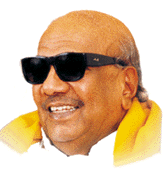|
"To us
all towns are one, all men our kin. |
| Home | Whats New | Trans State Nation | One World | Unfolding Consciousness | Comments | Search |
|
"To us
all towns are one, all men our kin. |
| Home | Whats New | Trans State Nation | One World | Unfolding Consciousness | Comments | Search |
|
tamil nadu
New Delhi's Policy on Sri Lanka
Times of India, 6 June 2006  In
one stroke of a sentence, Tamil Nadu Chief Minister
Muthuvel
Karunanidhi has made it clear that he has no intention of whipping up
passions over violence in Sri Lanka or the refugee flow from that country to his
state. In
one stroke of a sentence, Tamil Nadu Chief Minister
Muthuvel
Karunanidhi has made it clear that he has no intention of whipping up
passions over violence in Sri Lanka or the refugee flow from that country to his
state. On May 25, Karunanidhi, freshly elected to power in Tamil Nadu, home to the largest concentration of Tamils in the world, held a 15-minute one-to-one meeting with Arumugam Thondaman, leader of the Ceylon Workers Congress (CWC) and a special envoy of Sri Lankan President Mahinda Rajapakse. On Monday, after calling on Prime Minister Manmohan Singh and separately meeting Congress president Sonia Gandhi in New Delhi, Karunanidhi revealed to reporters what he had told Thondaman: "The central government's policy (on Sri Lanka) will be the state government's policy." This is what he said. What he left unsaid was: if New Delhi considers the Liberation Tigers of Tamil Eelam (LTTE) a terrorist outfit or draws a distinction between the Tamil people and the Tigers, then that will be Tamil Nadu's view too. In other words, unlike the 1980s when Karunanidhi competed with his arch rival and AIADMK founder leader MG Ramachandran in expressing support to the Tamil cause, Tamil Nadu will now let New Delhi frame and execute India's Sri Lanka policy. Although Tamil Nadu's two dominant parties, the DMK and AIADMK, had stopped supporting the LTTE after the 1991 assassination of former prime minister Rajiv Gandhi, this is the first time Karunanidhi is publicly making his stand so forthrightly clear. It also shows his confidence level and his understanding of the popular psyche in Tamil Nadu. This is significant and comes as escalating violence in Sri Lanka is sending a fresh wave of Tamils into Tamil Nadu as refugees and after pro-LTTE Tamil politicians in the island hailed Karunanidhi following his election victory in May. Tamil Nadu is separated from Sri Lanka by a narrow strip of sea. It played host to thousands of Tamil refugees in the 1980s besides all Tamil guerrilla groups. LTTE chief Velupillai Prabhakaran was based in the state for over three years. Karunanidhi went out of the way to plead the LTTE's cause even during the Indian military intervention in Sri Lanka, despite being ignored by Prabhakaran when MGR was chief minister. The DMK paid a heavy price when the Tigers assassinated Gandhi near Chennai May 21, 1991. By the time Karunanidhi returned to power in 1996, he was a much-mellowed man on Sri Lanka. Times too have changed. In 1989, when he had a soft corner for LTTE, he boasted that he spoke on behalf of "world Tamils". Very soon, however, LTTE journals were calling Prabhakaran the leader of all Tamils. And unlike the era when the Tamil side was seen in Tamil Nadu as waging a just battle, the terrorist tag the Tigers have globally earned has added to the disenchantment in the state. Tamil Nadu officials are doing what they can for the Tamils coming by boats from Sri Lanka. But the mass emotive solidarity of the 1980s does not exist. Reached on telephone, a Rameshwaram resident reflected the dominant opinion: "We are sorry for these people. But beyond that we would not like to get involved." The other day, speaking said from Colombo, Sri Lankan Tamil politician V Anandasangaree moaned that his letter to Karunanidhi had gone unanswered. If the chief minister's remarks in New Delhi on Monday are any indication, Anandasangaree is unlikely to get any response. The DMK chief does not want to get pushed around by happenings in neighbouring Sri Lanka. |
|
|